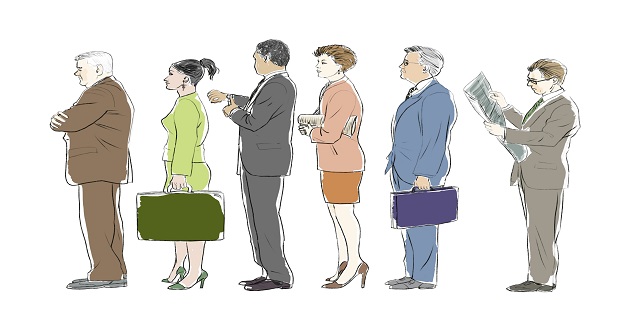
Business people waiting in line
We have been in Barcelona, Spain this week delivering cultural competence education to a global leadership team of a high tech company. We stayed at a hotel that was hosting meetings for several companies other than our client.
Adapting to the culture where it is customary to eat dinner after 9pm, we (including our spouses) were leaving the hotel about 9:30 to go to dinner on one rainy evening, and to our frustration, the queue for a taxi was really long. We realized that we would have to stand in the rain (umbrellas were provided but it was really kind of chilly that evening—probably about 55°F) for a least twenty minutes. After debating whether we should just eat at the hotel’s restaurant, we decided that we would brave the elements.
As we continued to wait and edge closer to the front of the line, we noticed that there was another group of three or four (not a part of our client’s group) that had formed starting a separate line. They stood to our right, speaking and laughing, I think in German.
Well low and behold and much to our chagrin, when it was our turn this group hurried past us and tried to claim the cab as their own! We were shocked as were others who came to our defense, yelling to this group that is was not their turn, that they had cut the line. One of the interlopers had the audacity to say that the person vacating the taxi was “their guy” as if to suggest that this person had reserved the taxi for them. It was pretty obvious that the parting customer did not know these people.
After our spouses (“the guys”) took control of the situation, ordering the line cutters to step back and that there was no way they would take this taxi, they retreated and we were on our way.
As you can well imagine emotions ran high and we talked about the incident for the rest of the evening (actually the rest of the trip). I tried to suggest that we were likely dealing with different cultural norms about what is acceptable behavior relative to “waiting your turn”. The guys were not having it. “Are you kidding me? This is just rude and unacceptable behavior in any culture,” opined my significant other. “There is right and there is wrong and this was just plain wrong,” offered another’s husband. I did not like the behavior, either, but I suspected that the “perpetrators” did not interpret what they did as harshly as we did. It was even suggested that there was a racial motivation. They claimed that the group waited until it was our turn to “make their move.” I was not convinced the “line cutters” targeted us because of our race.
This was actually not the first time I had experienced a different behavioral interpretation of queuing. I was on a connecting flight some years ago in Zurich and I was appalled that when it was time to board there were no queuing rules. Everybody just got up and started to find a place in the line, with some actually cutting. This was my first time experiencing this alternate “line forming” approach.
Two days after our incident in Barcelona when we had finally stopped talking about it, the issue came up again in one of the training sessions. I asked the question, “Can you give me some examples of where there are different behavioral interpretations based on culture?” “I am from Britain and we always honor queues but this is not the case in other countries, like Germany,” was one response. I chuckled to myself and told the group about our recent experience.
I think that being culturally competent does not mean that you cannot react negatively to behavior that goes against your own norms, but you may need to temper your response within a cultural framework. Does that mean you excuse what you think is bad behavior? No. And we did not. We did not allow the “line cutters” to have their way because I do believe that there is a more universal norm of honoring queues. It also does not mean that we should stereotype all Germans as “rude and disrespectful” as a result of this experience. Perhaps the more culturally competent view would be that the group probably did not interpret their behavior as so egregious.


















